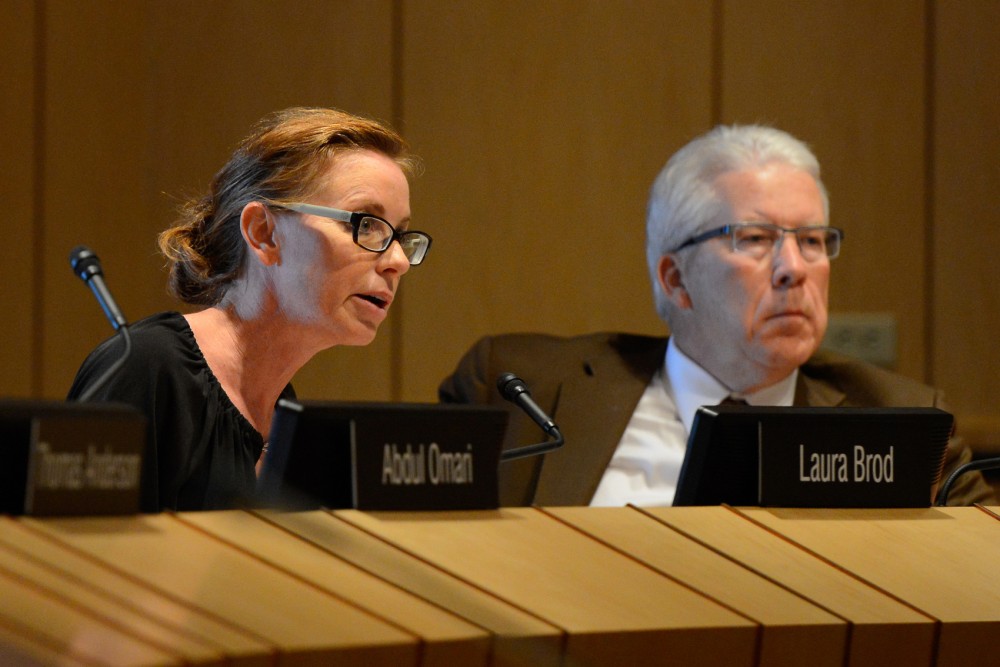Some members of the Board of Regents would like additional oversight of the athletics department and its coaches amid a national search for an athletics director.
A resolution introduced by Regent Michael Hsu at Thursday’s board meeting would require large coaching contracts to receive regent approval. Another proposal unveiled the same day would create a regents committee to set priorities for the department.
Hsu said he crafted the resolution when concerns surfaced about men’s basketball head coach Richard Pitino’s 2015 contract extension, which included a $7.1 million buyout. The contract was signed one day after former athletics director Norwood Teague’s resignation last August.
While Hsu said he isn’t calling for Pitino to be fired, he wants to see more oversight when coaches are hired because of the costs that the school could incur if they do decide to fire a coach.
“There are some regents that are opposed to approving coaches’ contracts,” Hsu said. “But what they don’t understand is, we could be committed to some sizeable payments in the future. Imagine what coaches’ contracts are going to look like in 20 years.”
The Gophers men’s basketball team posted a 2-16 record in the Big Ten and finished 8-23 overall this season — the worst record in Pitino’s three years with the team. The team also had its share of problems off the court. Most recently, three players were suspended after sharing a sexually explicit video over social media last month.
Hsu pointed to the high costs of firing a coach and said he thinks the school is still making payments after the school fired former men’s head basketball coach Tubby Smith in 2013.
“You don’t want to be in a position where you can’t fire a coach,” Hsu said.
After an almost-hourlong discussion, the board voted to send the proposal to the board’s Governance and Policy Committee in May when the regents reconvene.
The resolution would allow the board to approve or deny contracts exceeding $250,000 annually or those with a $600,000 total cost.
In the mid-’90s, Hsu said the board previously had the authority to approve coaches’ contracts.
Under current University policy, the board has the authority to approve transactions when they are of high public interest or have a value of more than $2 million.
“We … have been ignoring the fact that the policy covers approving coaches’ contracts because of the size and also because of the fact that there’s high public interest,” Hsu said.
The desire for more oversight
Regent Darrin Rosha, followed with his own proposal at Thursday’s meeting, which would create a six-regent committee to recommend budget principles and set priorities for the athletics department.
Rosha said the new committee would allow the board to establish guidelines for the athletics director.
“As we go forward, this is the time for us to provide this input,” Rosha said. “I think this is the kind of guidance we should be providing to the president and his committee.”
At the meeting, Rosha withdrew his resolution after promises that the board will revisit the issue in May.
During the discussion board Chair Dean Johnson raised concerns about the how a potential athletics director would perceive the job.
“If I’m a potential athletics director candidate at the University of Minnesota, and I’m listening to this discussion and doing my homework … I’m going to scratch my head and say, ‘What kind of job am I getting myself into?’ ” Johnson said at the meeting.
Two regents — Thomas Anderson and Peggy Lucas — along with 14 others in the University community, have been selected to offer advice to University President Eric Kaler during the athletics director search.
Regent Laura Brod said she partially supported the resolution and said that she disagrees that potential hires would be scared away by the board’s involvement with the search.
“That’s a straw man argument,” she said. “I think any senior leader should want clear principles for them to do their job.”
Regent Richard Beeson said he opposed the resolution because it may give the impression that the board would micromanage the athletics department, and the first thing the new department leader would address are priorities and budget.
“It’s premature for us talk about a structure at the board level until that person gets in,” he said Thursday.


